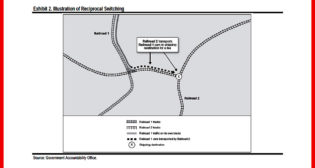
Full Rates for Poor Service?
Written by Ann WarnerIn an Aug. 3 commentary published on-line by Railway Age—“Service is Job One, But What About Rates?”—former STB Chief Economist Dr. William F. Huneke makes the vital point that the reasonableness of service cannot be separated from the reasonableness of rates. Unfortunately, most shippers experience market dysfunction on both sides of that equation.
Dr. Huneke begins by juxtaposing automobiles and asserts that Ford “in the mid-1990s … did not face a regulator that could issue service orders.” But Congress well before then passed the National Traffic and Motor Vehicle Safety Act of 1966, authorizing safety recalls, such as Ford’s recall of 1.5 million Pintos in 1978.*
Automakers, not car buyers, pay for recall repairs. In contrast, railroads typically continue to be paid their full rate when they provide poor service, while shippers suffer numerous harms that regularly go uncompensated. Those harms include lost production, sales and profits for delayed and missed shipments, additional railcar costs due to inadequate and inconsistent service, and associated bunching and demurrage. The relationship is, with limited exception, decidedly uneven, even where shippers enter into “voluntary” contracts with railroads or ship exempt products.
Consider the Sanimax case, where Dr. Huneke suggests that UP should receive a higher rate after having been ordered to provide five days a week “premium” service instead of three days. But he reverses the sequence. UP originally provided five days a week service, before unilaterally reducing service. There is no suggestion that UP offered to share with Sanimax any of the savings from reducing its service.
Sanimax aptly illustrates the railroad industry’s thrust since the broad adoption of Precision Scheduled Railroading (PSR) starting around 2015. Rather than grow volume, the railroads focused on cutting costs and investment—“doing less with less,” in the words of former STB Chair Ann Begeman—while charging more for reduced service to achieve ever-lower operating ratios. The objective is to avoid passing savings through to shippers, as occurs in competitive markets.
In short, Dr. Huneke quite correctly notes the linkage between rates and service, but the problem is that the linkage faded long ago. The railroads can impose inflated rates, far beyond those needed to recoup their cost of capital, without providing commensurate service or even maintaining the ability to do so, especially under PSR.
The railroads’ inability and refusal to provide adequate service is exactly what prompted Senators Baldwin (D-Wisc.) and Marshall (R-Kan.) to introduce their bipartisan Reliable Rail Service Act to tighten the common carrier obligation. The legislation is needed because the market does not provide sufficient discipline, even as it enables railroads to engage in massive buybacks and dividends that dwarf their labor and capital costs.
In a functional and competitive market for railroad transportation, reasonable rates bring reliable service. As things stand now, few shippers obtain one, and most experience neither on a consistent basis.

Managing Partner of Ann Warner LLC, Ann is a well-known government relations leader providing strategic, individualized Federal government relations engagement services to the transportation and supply chain sectors. Her rail shipper clients are the Freight Rail Customer Alliance, National Industrial Transportation League and Private Railcar Food & Beverage Association.



